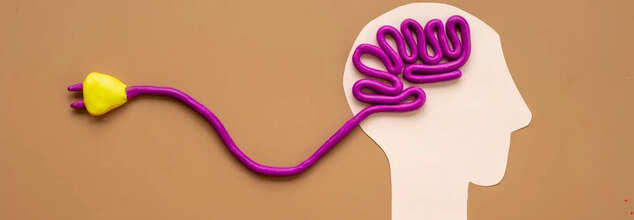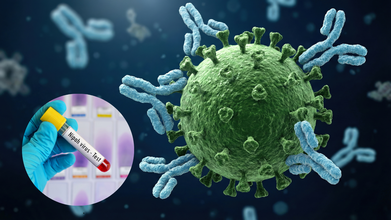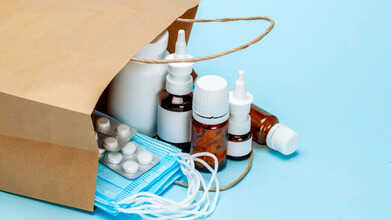- Health Conditions A-Z
- Health & Wellness
- Nutrition
- Fitness
- Health News
- Ayurveda
- Videos
- Medicine A-Z
- Parenting
6 Best Evidence-Based Supplements for Brain Fog

Brain fog (Credit: Canva)
Brain fog, a condition characterized by difficulty concentrating, memory issues, and mental fatigue, can often be alleviated by improving certain nutrient levels in the body. Key nutrients, including vitamins and minerals, play a crucial role in supporting brain health and reducing brain fog symptoms.
1. Vitamin D
Vitamin D is essential for immune function and brain health. Deficiencies in vitamin D can contribute to cognitive decline and brain fog, particularly in individuals suffering from depression. Low vitamin D levels are commonly found in people with depressive symptoms, which can worsen memory and concentration. Studies suggest that vitamin D supplements may not only increase vitamin D levels but also help improve mood and cognitive function, potentially alleviating brain fog. A small study on postmenopausal women revealed that those who supplemented with vitamin D showed improved memory and learning abilities compared to those who took lower doses.
2. Omega-3 Fatty Acids
Omega-3 fatty acids, particularly eicosapentaenoic acid (EPA) and docosahexaenoic acid (DHA), are well known for supporting brain health. Research shows that omega-3 supplements can enhance memory, attention, and mood. A study involving adults with low omega-3 intake found that supplementing with DHA for six months significantly improved memory. Additionally, omega-3s have been shown to help reduce symptoms of depression and anxiety, which are often linked to brain fog. Regular supplementation of omega-3s may boost cognitive function, especially in people experiencing mental fatigue and poor concentration.
3. Magnesium
Magnesium plays a key role in numerous bodily functions, including nerve function and energy production. Many individuals are magnesium deficient, which can lead to brain fog symptoms like poor focus and concentration. Stress can exacerbate magnesium deficiency, further impairing cognitive abilities. Research shows that magnesium supplements can reduce stress-related brain fog and improve cognitive performance. Older adults with higher magnesium levels have shown better cognitive function and a reduced risk of cognitive impairment. Magnesium also helps in managing anxiety and depression, which can both contribute to brain fog.
4. Vitamin C
Vitamin C is widely recognized for its immune-boosting properties, but it also supports brain function. Studies have demonstrated that individuals with adequate vitamin C levels perform better on cognitive tests involving memory, attention, and focus. Low vitamin C levels are linked to cognitive decline and mood disorders. Supplementing with vitamin C may improve mood and alleviate brain fog, particularly in individuals experiencing subclinical depression. Ensuring optimal vitamin C intake can have a positive impact on both mental clarity and overall cognitive performance.
5. B Vitamins
The B vitamins, including B6, B12, and folate, are crucial for cognitive function. Deficiencies in these vitamins can result in symptoms of brain fog, such as poor concentration and memory problems. Supplementing with B vitamins has been shown to improve cognitive function in individuals with deficiencies. For example, B12 supplementation has been linked to improved memory and attention in people with low levels of this vitamin. Research also indicates that higher B vitamin levels may enhance overall brain health, making them an important tool for combating brain fog.
6. L-Theanine
L-theanine, a compound found in green tea, has been shown to improve cognitive function, memory, and reaction time. Studies suggest that L-theanine can help reduce mental stress and improve relaxation, which in turn supports better focus and mental clarity. Regular L-theanine supplementation has been associated with improved sleep quality, reduced anxiety, and better cognitive performance. By enhancing relaxation and reducing stress, L-theanine can help alleviate brain fog symptoms.
Brain fog can significantly impact daily life, but the right nutritional interventions can help improve mental clarity and cognitive function. Vitamin D, omega-3 fatty acids, magnesium, vitamin C, B vitamins, and L-theanine are all essential nutrients that support brain health. Ensuring adequate levels of these nutrients through diet or supplements can help reduce brain fog, improve mood, and boost cognitive performance. However, it is important to consult with a healthcare provider before starting any new supplementation regimen.
Doctor Debunks Five Myths Around Nipah Virus

Credits: Canva
West Bengal is witnessing a Nipah virus outbreak, with five cases of the disease detected in just one week. In an age where information travels faster than verification, fear often fills the gaps left by facts. Each time the Nipah virus makes headlines, anxiety spikes, driven by rumors and alarming social media claims. Doctors say this reaction is understandable but unnecessary. Nipah is a serious illness, but it is not an uncontrollable mystery. Understanding what is true and what is not can help people stay cautious without slipping into panic.
Dr Satya Ranjan Sahu, Senior Consultant in Pulmonology at Narayana Hospital, Gurugram, explains that misinformation can sometimes be more dangerous than the virus itself. Here are some of the most common myths around Nipah virus, and what medical science actually says.
Myth 1: Nipah virus spreads easily through the air
Many people assume Nipah spreads like COVID-19 or seasonal flu. That is not accurate. Nipah does not spread through the air over long distances. Most infections occur after close contact with infected animals or through exposure to bodily fluids of an infected person, such as saliva or respiratory secretions, usually during caregiving. Human-to-human transmission is possible, but it typically requires prolonged and unprotected close contact.
Also Read: Nipah Virus Case Detected In Two Nurses From West Bengal
Myth 2: Getting infected always leads to death
The severity of Nipah has led to the belief that infection equals death. Doctors strongly refute this. While Nipah can be life-threatening, not every case is fatal. Many patients recover, especially when the infection is identified early and medical care begins promptly. Early diagnosis, hospital monitoring, and supportive treatment can significantly improve outcomes.
Myth 3: There is no treatment, so nothing can help
It is true that there is no specific antiviral drug approved to cure Nipah virus. However, this does not mean patients cannot be treated. Medical care focuses on managing symptoms, supporting breathing, maintaining hydration, and preventing complications. With proper hospital care, patients can be stabilised and supported through the illness. Calling Nipah untreatable often discourages people from seeking timely medical help, which can be dangerous.
Myth 4: Without a vaccine, prevention is impossible
The absence of a vaccine can make people feel helpless, but prevention does not depend on vaccines alone. Simple steps are highly effective. Maintaining good hygiene, avoiding contact with sick animals, using protective gear while caring for infected individuals, and following public health advisories all reduce risk. Doctors stress that informed and cautious behavior remains one of the strongest tools against Nipah.
Read: Unique Symptoms Of Nipah Virus Found In West Bengal And How Long Infection Now Last
Myth 5: All fruits are unsafe to eat
Fruit bats are natural carriers of the Nipah virus, which has led to widespread fear around fruit consumption. Doctors clarify that fruits are not automatically dangerous. Properly washed, peeled, and hygienically handled fruits are generally safe to eat. Most human infections have been linked to close contact with infected animals or people, not routine fruit consumption.
What doctors want people to remember
Nipah virus is serious, but it is not as easily spread or as hopeless as many believe. Early symptoms may include fever, headache, muscle pain, or vomiting, and in some cases progress to breathing or neurological problems. Seeking medical care at the first sign of symptoms can save lives. Health experts urge the public to rely on verified information from trusted medical sources and avoid spreading unconfirmed claims.
During outbreaks, calm awareness matters. Separating myths from medical facts allows communities to respond with care, responsibility, and confidence rather than fear.
Measles Symptoms Explained: Can The Infection Be Deadly?

Credits: Canva
As measles continues to spread across the United States, with recent case numbers climbing to their highest level in 33 years, growing numbers of Americans are becoming concerned about how at risk they may be.
Health officials in Philadelphia confirmed a potential measles exposure at Philadelphia International Airport and several public transport locations across the city in early January. The Centers for Disease Control and Prevention has also flagged earlier measles outbreaks across Pennsylvania, New Jersey, and New York City.
Adding to the concern, infectious disease tracker BMJGroup reported that measles cases recorded in 2025 are the highest seen since at least 1992.
Against this backdrop, it is important to understand whether measles can be fatal and to recognise the symptoms that should not be ignored.
Is Measles Deadly?
Yes, measles can be deadly and carries a significant risk of death, according to the Centers for Disease Control and Prevention.
“Measles can lead to serious health complications, including pneumonia, inflammation of the brain known as encephalitis, and death,” the CDC states. “Between one and three out of every 1,000 people infected with measles will die. Around one in five people with measles will require hospital care, and one in every 20 children with measles develops pneumonia, which is the leading cause of measles-related deaths in young children.
“One in every 1,000 people with measles will experience brain swelling, which can result in permanent brain damage.”
Measles Symptoms Develop In Three Stages
According to the Mayo Clinic, measles symptoms usually appear in three distinct stages.
Stage 1: Incubation period (10 to 14 days)
During this phase, there are typically no noticeable or warning symptoms.
Stage 2: Early symptoms begin
Symptoms at this stage may include a dry cough, fever, red and inflamed eyes known as conjunctivitis, a runny nose, and a sore throat.
Stage 3: Acute illness and rash
“In the third stage, a rash begins to develop, usually starting on the face. Small white spots called Koplik spots may appear inside the mouth two to three days after symptoms first appear,” the Mayo Clinic explains. “The measles rash typically shows up three to five days after the initial symptoms.
“Over the following days, the rash spreads to the arms, torso, and legs. Alongside the rash, fever often rises rapidly and can exceed 105 degrees Fahrenheit,” the guidance continues. “Eventually, the fever subsides, and the rash fades from the body starting at the head and moving downward.”
How Do You Treat Measles?
There is no specific antiviral medication that cures measles. However, people who have not previously been vaccinated may still be able to reduce the severity of illness if action is taken quickly after exposure.“If individuals aged six months or older are exposed to measles and do not have immunity from prior infection or vaccination, they can receive the measles vaccine within three days of contact with the virus,” the Mayo Clinic advises. “After vaccination, quarantine at home is not required.
“For children up to 11 months old who are exposed and are not immune, a dose of antibodies known as immune globulin can be given within six days of exposure to help the body fight the infection.”
Receiving this antibody treatment requires a 21-day quarantine period.
Spironolactone Is Popular For Acne, But Experts Say It Is Not Risk-Free

CREDITS: CANVA
A notice has been issued for people who use the drug spironolactone. It is commonly prescribed for heart conditions, high blood pressure, and fluid retention. However, doctors say the medication is also used for several other health concerns.
According to the British Association of Dermatologists (BAD), spironolactone is prescribed “off licence” for women dealing with acne, female pattern hair loss, and hirsutism, a condition marked by excessive hair growth in areas such as the chin and upper lip. The NHS also states that spironolactone is a well-established and generally safe medicine that is sometimes used off licence to treat acne. Off licence means the drug is not officially approved for that specific condition under the UK prescribing licence.
Despite this, the NHS says spironolactone is available through the health service and is considered a useful alternative to long-term antibiotics. A study published in 2022 found that the drug is effective and safe for women who have persistent acne.
What Is Spironolactone?
Spironolactone, sold under the brand name Aldactone, is also used to help manage polycystic ovary syndrome, commonly known as PCOS. However, it is not usually prescribed to men for skin-related conditions.
While the medication can be helpful for many women, experts warn that it does come with side effects and certain dietary restrictions. Here is what patients should know before starting treatment.
How Does Spironolactone Work For Acne?
The NHS explains that spironolactone does not permanently cure acne, but it can help control breakouts and gradually clear the skin. The drug works slowly, meaning results are not immediate.
Most women begin to see improvement after about three months of use, but treatment usually needs to continue for at least six months. In some cases, it may take the full six months to experience the maximum benefit.
What Are The Side Effects Of Spironolactone?
For acne, spironolactone is usually prescribed at doses ranging from 50mg to 150mg per day. Many patients start with 50mg daily for the first month, depending on how well they tolerate the medication and whether any side effects appear.
If there are no concerning side effects and blood test results remain normal, a doctor may increase the dose to 100mg per day. NHS guidance says the tablets should be swallowed whole with water and taken after food.
Spironolactone Common Side Effects
- Sore or tender breasts
- Irregular periods, which may improve if combined with the contraceptive pill or a hormonal intrauterine device
- A drop in blood pressure when standing up, which can cause dizziness or light-headedness
Spironolactone Uncommon Side Effects
- Skin rashes
- Feeling drowsy
- Tiredness
- Headaches
- Reduced sex drive
Spironolactone Rare Side Effects
- Confusion
- Poor coordination
- Increased need to urinate, as spironolactone is a water tablet
Spironolactone Very Rare Side Effects
High potassium levels in the blood, especially in people over 45 or those with heart or kidney disease
Changes in kidney or liver blood tests, which usually return to normal if the dose is reduced or stopped
Cancer, which has been linked to very high doses in animal studies, but not seen in people taking standard doses.
The NHS advises that spironolactone should not be taken during pregnancy or while trying to conceive. It should also be avoided by people with Addison’s disease or serious kidney problems.
Alcohol can worsen certain side effects, such as dizziness, so cutting back on drinking is recommended. Reliable contraception should be used while taking spironolactone, and the combined contraceptive pill may help reduce side effects while also improving acne.
Spironolactone NHS Warning
Doctors advise that it is usually safe to try for a baby one month after stopping the medication. The NHS stresses the importance of informing your doctor about any other medicines you are taking before starting spironolactone. This includes ACE inhibitors, anti-inflammatory painkillers such as aspirin or ibuprofen, certain antibiotics, other diuretics, heart medications like digoxin, drugs for high blood pressure, and potassium supplements.
As per Mirror, people taking spironolactone are advised not to use low-sodium salt or salt substitutes such as Lo-Salt, as these products contain high levels of potassium. Using them alongside spironolactone can raise potassium levels to a dangerous range.
The NHS also recommends limiting foods and drinks high in potassium, including bananas, avocados, pulses, nuts, and salmon. A doctor or dietitian can help plan a low-potassium diet if needed.
Disclaimer:
This article is for general information only and is not a substitute for medical advice. Always consult a qualified healthcare professional before starting, stopping, or changing any medication, including spironolactone.
© 2024 Bennett, Coleman & Company Limited

